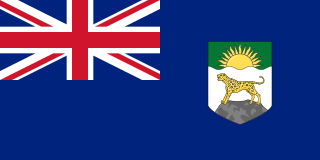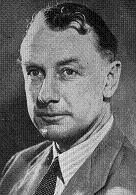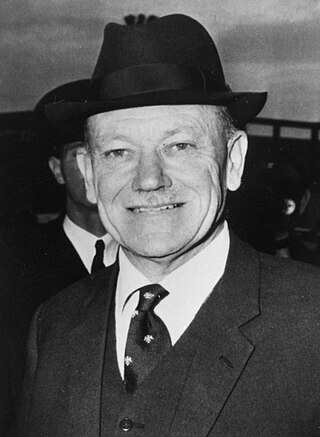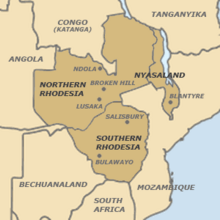
Nyasaland was a British protectorate located in Africa that was established in 1907 when the former British Central Africa Protectorate changed its name. Between 1953 and 1963, Nyasaland was part of the Federation of Rhodesia and Nyasaland. After the Federation was dissolved, Nyasaland became independent from Britain on 6 July 1964 and was renamed Malawi.

Northern Rhodesia was a British protectorate in Southern Africa, now the independent country of Zambia. It was formed in 1911 by amalgamating the two earlier protectorates of Barotziland-North-Western Rhodesia and North-Eastern Rhodesia. It was initially administered, as were the two earlier protectorates, by the British South Africa Company (BSAC), a chartered company, on behalf of the British Government. From 1924, it was administered by the British Government as a protectorate, under similar conditions to other British-administered protectorates, and the special provisions required when it was administered by BSAC were terminated.

Southern Rhodesia was a landlocked, self-governing British Crown colony in Southern Africa, established in 1923 and consisting of British South Africa Company (BSAC) territories lying south of the Zambezi River. The region was informally known as South Zambesia until annexation by Britain, at the behest of Cecil Rhodes's British South Africa Company. The bounding territories were Bechuanaland (Botswana), Northern Rhodesia (Zambia), Portuguese Mozambique (Mozambique) and the Transvaal Republic.

Sir Roland "Roy" Welensky was a Northern Rhodesian politician and the second and last Prime Minister of the Federation of Rhodesia and Nyasaland.
Dunduzu Kaluli Chisiza (8 August 1930 – 2 September 1962), also known as Gladstone Chisiza, was an African nationalist who was active in the independence movements in Rhodesia and Nyasaland, respectively present-day Zimbabwe and Malawi.
The colonial history of Southern Rhodesia is considered to be a time period from the British government's establishment of the government of Southern Rhodesia on 1 October 1923, to Prime Minister Ian Smith's unilateral declaration of independence in 1965. The territory of 'Southern Rhodesia' was originally referred to as 'South Zambezia' but the name 'Rhodesia' came into use in 1895. The designation 'Southern' was adopted in 1901 and dropped from normal usage in 1964 on the break-up of the Federation of Rhodesia and Nyasaland, and Rhodesia became the name of the country until the creation of Zimbabwe Rhodesia in 1979. Legally, from the British perspective, the name Southern Rhodesia continued to be used until 18 April 1980, when the name Republic of Zimbabwe was formally proclaimed.
Henry Masauko Blasius Chipembere was a Malawian nationalist politician who played a significant role in bringing independence from colonial rule to his native country, formerly known as Nyasaland. From an early age Chipembere was a strong believer in natural justice and, on his return in 1954 from university in South Africa, he joined his country's independence struggle as a nationalist strategist and spokesman. In 1957, considering that the independence movement needed a strong leader similar to Kwame Nkrumah, and considering himself too young for this task, he joined with other young nationalists in inviting Hastings Kamuzu Banda to return to Nyasaland as the movement's leader.
Sir Glyn Smallwood Jones was a British colonial administrator in Southern Africa. He was the last governor of Nyasaland from 1961 until it achieved independence in 1964. He served as the only governor-general of Malawi from 1964 until it became a republic in 1966. In 1964, he was appointed a GCMG.

The Federation of Rhodesia and Nyasaland, also known as the Central African Federation (CAF), was a colonial federation that consisted of three southern African territories: the self-governing British colony of Southern Rhodesia and the British protectorates of Northern Rhodesia and Nyasaland. It existed between 1953 and 1963.

A constitutional referendum was held in Southern Rhodesia, then a constituent territory of the Federation of Rhodesia and Nyasaland, on 26 July 1961. The new constitution was approved by about 66% of those who voted; turnout was 77%.

Sir Robert Perceval Armitage was a British colonial administrator who held senior positions in Kenya and the Gold Coast, and was Governor of Cyprus and then of Nyasaland during the period of decolonisation.
The Devlin Commission, officially the Nyasaland Commission of Inquiry, was a Commission of Inquiry set up in 1959 under the chairmanship of Mr.Justice Devlin, later Lord Devlin, after African opposition to the Federation of Rhodesia and Nyasaland, particularly its farming and rural conservation policies, and demands for progress towards majority rule promoted by the Nyasaland African Congress under its leader Dr Hastings Banda led to widespread disturbances in Nyasaland and some deaths. A state of emergency was declared in March 1959; about 1,300 people, many of whom were members of the Nyasaland African Congress party, were detained without trial, over were 2,000 imprisoned for offences related to the emergency and the Congress itself was banned. During the State of Emergency and the week preceding it, a total of 51 people were killed by troops or the police. Although the four members of the Commission were members of The British Establishment, its findings were highly unfavourable to the Nyasaland Government.

The Bledisloe Commission, also known as the Rhodesia-Nyasaland Royal Commission, was a Royal Commission, appointed in 1937 and undertaking its enquiries between 1937 and 1939. to examine the possible closer union of the three British territories in Central Africa, Southern Rhodesia, Northern Rhodesia and Nyasaland. These territories were to some degree economically inter-dependent, and it was suggested that an association would promote their rapid development. Its chairman was Lord Bledisloe.
William John Harper was a politician, general contractor and Royal Air Force fighter pilot who served as a Cabinet minister in Rhodesia from 1962 to 1968, and signed that country's Unilateral Declaration of Independence (UDI) from Britain in 1965. Born into a prominent Anglo-Indian merchant family in Calcutta, Harper was educated in India and England and joined the RAF in 1937. He served as an officer throughout the Second World War and saw action as one of "The Few" in the Battle of Britain, during which he was wounded in action. Appalled by Britain's granting of independence to India in 1947, he emigrated to Rhodesia on retiring from the Air Force two years later.
The Armitage Report was a report into the actions of the Nyasaland government in declaring a State of Emergency in March 1959 and actions of the police and troops in the aftermath of that declaration. It was supposed to have been a despatch prepared in Nyasaland by the Governor of that protectorate, Robert Perceval Armitage, but was in fact prepared in London by a working party that included Armitage, British government ministers and senior Colonial Office officials, in an attempt to counteract various criticisms contained in the Report of the Devlin Commission. Both reports accepted that a State of Emergency was necessary in view of the level of unrest in Nyasaland, but the Armitage Report approved of the subsequent actions of the police and troops, whereas the Devlin Report criticised their illegal use of force and stigmatised the Nyasaland government's suppression of criticism as justifying it being called a "police state". Although the Armitage Report was used by the government of the day to discredit the Devlin Report initially, and to justify its rejection of many of the Devlin Commission's findings, in the longer term the Devlin Report helped to convince the British Government that the Federation of Rhodesia and Nyasaland was not acceptable to its African majority and should be dissolved. Devlin was vindicated and approached for advice on constitutional change, but Armitage was seen as an obstacle to progress and asked to leave Nyasaland prematurely.

Sir Thomas Hugh William Beadle, was a Rhodesian lawyer, politician and judge who served as Chief Justice of Southern Rhodesia from March 1961 to November 1965, and as Chief Justice of Rhodesia from November 1965 until April 1977. He came to international prominence against the backdrop of Rhodesia's Unilateral Declaration of Independence (UDI) from Britain in November 1965, upon which he initially stood by the British Governor Sir Humphrey Gibbs as an adviser; he then provoked acrimony in British government circles by declaring Ian Smith's post-UDI administration legal in 1968.
Operation Sunrise was the name given to a police and military action conducted by the authorities in the Central African protectorate of Nyasaland which started on 3 March 1959, initially to detain and intern 350 individuals who were considered a potential threat to law and order in anticipation of the declaration of a State of Emergency. Although it is sometimes considered to involve only the incidents of 3 March, the Devlin Commission report is clear that it was one of two distinct operations by the security forces, reinforced from outside Nyasaland, involving the arrest and detention members of the Nyasaland African Congress. It involved not only those members of Congress initially arrested, but others arrested and detained without trial in the course of the emergency. The operation was described in some detail in the Devlin Commission report and that account has been amplified by Colonial Office documents not made available to the Devlin Commission.
The Southworth Commission was a Commission of inquiry appointed by the governor of the British Nyasaland Protectorate to investigate allegations of police brutality against demonstrators protesting against the State of Emergency that the governor had declared in February 1959. The demonstration took place during the visit of the British Prime Minister, Harold Macmillan to Blantyre in January 1960 as part of his African tour, and was witnessed by British and other journalists, some of whom made allegations against senior European police officers. The inquiry cleared the police of brutality but went beyond its terms of reference by heavily criticising several British correspondents for distorting events.
The Nyasaland emergency of 1959 was a state of emergency in the protectorate of Nyasaland, which was declared by its governor, Sir Robert Armitage, on 3 March 1959 and which ended on 16 June 1960. Under the emergency powers that operated during the Emergency, over 1,300 members or supporters of the Nyasaland African Congress (Congress) were detained without trial, and most of the party's leaders including its president, Dr. Hastings Banda, were imprisoned in Southern Rhodesia after being arrested on 3 March. Many other Africans were jailed for offences related to the Emergency, including rioting and criminal damage. In the week before the Emergency was declared and during its first month, over 50 Africans were killed and many more wounded by the colonial security forces, which included many European troops from Southern Rhodesia. Others were beaten by troops or armed police or had their huts destroyed and their property seized during punitive operations undertaken during the Emergency.

Malawi–Turkey relations are foreign relations between Malawi and Turkey. The Turkish ambassador in Lusaka, Zambia is also accredited to Malawi. Malawi is accredited to Turkey from its embassy in Berlin, Germany. Turkey has plans to open an embassy in Lilongwe.










